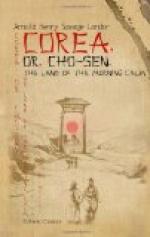“Yes,” I remarked, “your story is a very good one; but what part did this particular man, now at Fusan, take in the marauding scheme?”
“Oh, that I do not exactly know—in fact, no one knows more than this, that he was one of the eight Europeans who accompanied Oppert. Here at Fusan all the foreign residents look down on him, and his only pleasure is to come on board when a ship happens to call, that he may exchange a few words in a European tongue, for no one belonging to this locality will speak to him.”
I went on deck to look for the pirate, hoping to get, if possible, a few interesting and accurate details of the adventurous journey of the China, but he had already gone, and we were just on the point of raising our anchor, bound for Chemulpo.
On December 27th we steamed past Port Hamilton, formerly occupied by the British, where fortifications and a jetty had been constructed and afterwards abandoned, a treaty having been signed by Great Britain and China, to the effect that no foreign Power was to be allowed to occupy either Port Hamilton or any other port in the kingdom of Corea at any future time.
During that day we travelled mostly along the inner course, among hundreds of picturesque little islands of the Corean Archipelago, and in the afternoon of the 28th we entered the Imperatrice Gulf. On account of the low tide we had to keep out at sea till very late, and it was only towards sunset that we were able to enter the inner harbour where Chemulpo lies, protected by a pretty island on its western side. I bade good-bye to the jolly captain and mate, and getting my traps together, landed for the second time on Corean soil.
FOOTNOTES:
[1] Do means province.
CHAPTER II
Chemulpo—So-called European hotels—Comforts—Japanese concession—The Guechas—New-Year’s festivities—The Chinese settlement—European residents—The word “Corea”—A glance at Corean history—Cho-sen.
[Illustration: THE DONKEY OF A COREAN OFFICIAL]
When I land in a new country a strange sense of the unknown somehow takes possession of me. Perhaps in this, however, I am not alone. The feeling is in part, I think, due to one’s new surroundings, though chiefly to the facial expressions of the people, with which one is not familiar and probably does not quite understand. One may be a student of human character in only a very amateurish way, and yet without much difficulty guess by the twinkle in the eye, or the quivering of the underlip, whether a person is pleased or annoyed, but when a strange land is visited one is apt to be at first often deceived by appearances; and if, as has happened in my case, the traveller has suffered in consequence of being thus deceived, he is rather apt to look upon all that he sees with a considerable amount of caution and even suspicion.




